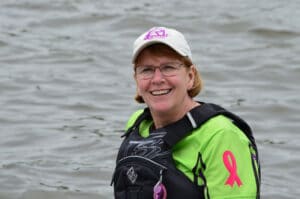By Deborah Jeanne Sergeant

In addition to the orange, gold and red foliage colors, you’re likely seeing a lot of pink this time of year as October is Breast Cancer Awareness Month.
Most people realize that a looped pink ribbon represents breast cancer awareness; however, many do not know about the origin of the campaign.
Ancient texts relate that ribbons used in décor have traditionally symbolized longing for those absent during wartime. The 1973 song, “Tie a Yellow Ribbon Round the Old Oak Tree” (Irwin Levine, L. Russell Brown), echoes the sentiment of a ribbon symbolizing support and welcome for a loved one at war.
According to www.pinkribbon.org, Charlotte Hayley, a breast cancer patient in California, thought the ribbon was appropriate to symbolize the fight against breast cancer. In 1991, she started distributing peach ribbons with a handbill urging more funding for breast cancer. Hayley handed them out at grocery stores and sent them to public figures such as former first ladies and Dear Abby.
Self magazine editor Alexandra Penney adapted the symbol by shifting the color to pink. In 1991, the Susan G. Komen Breast Cancer Foundation established the pink ribbon as a national symbol for breast cancer awareness by distributing one to every participant in the organization’s NYC Race for the Cure.
Though Hayley died at age 91 in 2014, her grassroots effort demonstrated that everyday people could make a difference. That is the mindset behind organizations like Komen, which was founded by Nancy G. Brinker in 1982 to fulfill a promise to her sister, Susan G. Komen as Komen was dying from breast cancer. Brinker said she would do everything she could to eradicate breast cancer. A sister’s promise has grown into an internationally recognized organization.
Andrea Moran, executive director of the Upstate New York affiliate, said that the grassroots beginnings of Komen “is one of our strengths, and that we focus only on breast cancer.
“We also take a 360-degree approach. It’s not just research or patient care or advocacy. Because we’re grassroots, a lot of what we achieve is community-led and integrated into the landscape of small towns and communities.”
The organization is shifting in 2020 and 2021 to consolidate local affiliates under a national organization based in Dallas.
“We’ll be able to engage even if there’s not an affiliate where they live,” Moran said. “We will continue to have a presence in Upstate New York.”
Local grassroot groups
Rob Jones, executive director of Breast Cancer Network of WNY, Inc. in Depew, said his nonprofit “supports women with breast cancer through all stages of survivorship.”
One example is the TLC Tote, which the organization gives to newly diagnosed women. It contains information on resources and personal comfort items. Windsong Radiology funds the totes. Jones added that Breast Cancer Network hands out about 200 totes annually, but there are about 1,400 new cases in the Buffalo area each year. About 300-400 people are members.
“We’d like to get those totes out to more people; they’re quite helpful,” Jones said.
The network also offers five support groups in Depew, including programming on survivorship and restorative health. Most of that is online because of the pandemic, but Jones said the support groups “haven’t lost a beat. People really depend on them.”
He said that the local aspect of everything the organization does makes the network stand out.
“We are a small, grassroots volunteer organization,” Jones said. “We don’t raise money to send out of town; everything is for Western New York individuals. All of our support is local.”
The only exception is a small grant from New York state.
“It’s important because there are so many people who need the support and services,” Jones said. “Anyone who’s gone through breast cancer joins the sisterhood that it creates. There’s a bond. We present an opportunity for them to socialize and network with each other.”
The Breast Cancer Network of WNY also supports research grants distributed by Breast Cancer Coalition of Rochester, which gives to Western New York research organizations.
Anne Kist directs Luminina Corp, dba Hope Chest in Getzville. Along with breast cancer support, the group has offered free fitness programs, nutritional classes and, in the summer months, dragon boat racing for 20 years.
“We’re all in the same boat — pun intended,” Kist said. “We don’t sit around in a circle discussing our cancer. If someone needs support, we’re here to support them. Some have gone through survivorship in different ways than others. We link up those who have had certain procedures done so they can talk about issues that might come up. Pretty much, we’re not trying to survive but thrive.”

Though most of its programming is virtual, Hope Chest has continued supporting its 200 members through the pandemic, though Kist said they miss hugging.
“We’re a big hugging group,” she added.
The nonprofit receives funding from donors.
“We try to empower our teammates to be better physically, mentally and emotionally,” Krist said.
This fall, Windsong Breast Care in Williamsville founded Windsong Cares Foundation, a board-operated charity that provides financial support for preventive cancer screening, cancer research and patient care. Funding from fundraisers and grants supports Windsong Cares.
Though not the only kind of cancer included, breast cancer is the foundation’s main focus, according to board member Gina Fedele. This includes mammography and other screening.
“There are a number of people who are uninsured and under-insured,” Fedele said. “This makes sure they have access.”
For genetic testing, individuals must meet requirement for insurance coverage, such as family history. Windsong Cares can help people who do not have adequate coverage. For patients requiring treatment, the cost can push and exceed $100,000. Even with insurance, co-pays and deductibles can be difficult for some patients to afford, especially considering the likelihood of lost work time during their illness.
The foundation provides financial support to other breast cancer organizations, including Breast Cancer Network.
The organization provides “access to education and cancer prevention are key to reducing mortality to cancer. Our vision is to transform our community into a healthier region with creative thinking, and prevention initiatives funded by our generous donors.
“More Than Strong,” the foundation’s first fundraiser, is Oct. 17 with a basket raffle and barbecued chicken sale.

